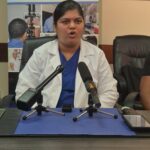Cancer patients in Barbados are now being seen within just two weeks of diagnosis at the Queen Elizabeth Hospital (QEH), a dramatic improvement from previous wait times that stretched to nearly five months.
Hospital officials on Friday hailed the development as a major step forward in cancer care, bringing the QEH in line with — and even exceeding — international standards.
“We’re achieving better than world standards,” declared QEH Chief Executive Officer Neil Clark.
“Fourteen days is the standard the NHS in the UK aspires to and often doesn’t achieve. I’m so proud of what the team has done.”
The announcement came on Friday at a media briefing where doctors and senior staff outlined a sweeping overhaul of the hospital’s oncology services.
The transformation, they said, wasn’t driven by any drop in demand — quite the opposite. It was the result of deliberate decisions to expand clinic capacity, clear patient backlogs, and increase frontline staffing.
Consultant radiation oncologist, Dr Lalitha Sripathi, said the difference has been dramatic: “Once a new cancer patient is registered with us, the time to see the patient used to be around 140 days. Now it has come down to just a couple of weeks.”
The number of new patients seen each month has also doubled, from around 25 to nearly 50, while follow-up visits now top 700.
Officials further reported that the department is on track to exceed 800 visits this month, following a campaign to bring forward patients who were previously scheduled for later in the year.
“We had patients who were registered in March and weren’t scheduled to be seen until September,” said senior radiation therapist Ian Weithers.
“We made adjustments to bring them in earlier,” he added, clarifying that the new numbers do not necessarily represent a spike in new cases, but an intentional move to become more efficient.
Weithers, who also serves as operations manager, acknowledged that the shift required more than just rescheduling.
“Our staff are sometimes here from early in the morning, pressing on until 5 p.m. to handle new consultations,” he said.
“It’s intense work, but there’s deep commitment in this department. We all have family and friends who have been through this system.”
The team credited much of the progress to new leadership and structural changes within the oncology unit, noting that the department is preparing to deliver even more advanced treatment with the linear accelerator set to be commissioned soon.
“We’re gearing up to provide world-class radiation treatment and we’re also adding a clinical oncologist, a haematologist, a medical oncologist, physicists, and radiographers to make this a comprehensive cancer service,” Dr Sripathi said.
The specialist didn’t just focus on treatment. She used her time at the podium to deliver a blunt and passionate message about cancer levels in Barbados, encouraging prevention.
“The most common cancers I see in women are breast cancer. In men, it’s colon cancer, followed by prostate,” she said. “And sadly, we’re seeing them in younger people, including a 20-year-old recently diagnosed with breast cancer.”
She warned against red and processed meats, sugary drinks, and canned foods, calling them proven carcinogens, while also urging Barbadians to stay active, cut alcohol and tobacco use, and undergo regular screening.
“Most cancers are preventable,” she said. “And once mutations happen, they can become hereditary. That’s when we start seeing cancer in the next generation.”
Dr Sripathi encouraged women to begin annual mammograms at age 40 and also advised men to start prostate screening by age 40.
She further recommended colonoscopies from age 50, or earlier in cases of family history.
Her warnings were solidified by a simple but profound statement: “Cancer is becoming a lifestyle disease.” (SM)
The post QEH slashes cancer patient wait time ‘from months to days’ appeared first on Barbados Today.

